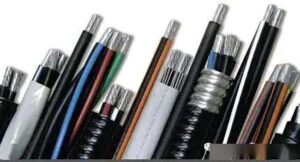İzolyasiya nədir?
Kabel izolyasiyası hər hansı bir kabelin vacib hissəsidir. O, teli örtən qeyri-keçirici materialdan hazırlanmışdır. Elektrik izolyasiyası kimi də tanınır.
İzolyasiyanın məqsədi cərəyanı kabelin qalan hissəsindən ayırmaqdır, onu məftil içərisində saxlamaq və ətraf mühitə daxil olmasının qarşısını almaq.
Eyni vaxtda, izolyasiya teli quraşdırma mühitindəki sərt şərtlərdən qoruyur və onun düzgün işləməsini təmin edir.
İzolyasiya müxtəlif materiallardan hazırlana bilər, telin hədəf tətbiqindən asılı olaraq.
Amma ümumilikdə, plastik, rezin, və floropolimerlər məftil izolyasiyasının ən çox yayılmış növləridir.

Plastik izolyasiya
Polivinil xlorid (PVC)
Polivinil xlorid nəmə davamlıdır, yanğın, və aşınma və bir çox mühitdə istifadə edilə bilər. Misal üçün, turşu, məhəbbət, və ozon.
PVC izolyasiya edilmiş kabellər də zövq və ya qoxu yoxdur, buna görə zəhərli deyillər. Bu material üçün icazə verilən temperatur aralığı -55 ° C-dən 105 ° C-ə qədərdir.
Yarı sərt (Sr) PVC
SR-PVC oxşar müqavimət xüsusiyyətlərinə malikdir PVC izolyasiya, Abasam müqavimət prioritet olduqda bu material daha yaxşıdır.
Rəhbər Pvc
Plenum PVC də PVC-dən hazırlanmışdır, Lakin hava dövranı olan daxili ərazilərdə quraşdırma üçün ən uyğun gəlir, məsələn, qaldırılmış mərtəbələr və ya düşmüş tavanlar kimi.
Polietilen (PE)
Polietilen, yüksək ötürmə sürətləri və aşağı kapasitans tələb olunduqda istifadə olunan sərt bir materialdır.
Polietilen də koaksial kabel izolyasiyası üçün üstünlük verilən seçimdir. Bu material lehiməyə davamlıdır, krekinq, və həlledicilər, -65 ° C və 80 ° C arasındakı temperaturda işləyir.
XLPE (çarpaz bağlı polietilen) İzolyasiya polietilen izolyasiyasının ümumi bir alt hissəsidir.
Polipropilen (Pp)
PP-nin oxşar xüsusiyyətlərinə malikdir, lakin əsasən qapalı mühitlərdə istifadə olunur. Bu izolyasiya üçün icazə verilən temperatur aralığı 30 ° C-dən 80 ° C-ə qədərdir.
Poliuretan (PUR)
Pur, əsasən aşağı temperatur və dəniz mühitində kabellər üçün istifadə olunan çevik bir materialdır. Nəmə davamlıdır, kimyəvi maddələr, və aşınma və 60 ° C-dən 90 ° C-ə qədər bir əməliyyat temperaturu var.
Rezin izolyasiya
Termoplastik rezin (Tpr)
TPR yüksək temperatur və sərt hava şəraitinə və yüksək emal sürəti tələb olunduqda ən yaxşı seçimdir.
Neopren (Polixloropren)
Neopren aşınmaya davamlıdır, yağ, və həlledicilər. Bu izolyasiya materialları telləri davamlı edir.
Etilen-propilen rezin (EPR)
EPR yüksək gərginlikli kabellərdə geniş istifadə olunur – Əksər qıcıqlandırıcılara çevik və davamlıdır. EPR kabel izolyasiyası üçün icazə verilən temperatur aralığı -50 ° C-dən 160 ° C-ə qədərdir.
Etilen-propilen-diene monomer (Epdm)
Epdm sərt hava şəraitinə qarşı davamlıdır, istilik və aşınma, həm də güclü bir dielektrik və çevik olmaq. Onun işləmə temperaturu aralığı -55 ° C-dir- 50 ° C-ə qədər.
Silikon
Silikon geniş istifadə olunan çevik sintetikdir rezin izolyasiya materialı. Bu material, 180 ° C-ə qədər olan temperaturdan yapışa biləcəyi üçün yüksək istilik sahələrində xüsusilə faydalıdır.
Fiberglas
Şüşə lif nəm və kimyəvi maddələrə davamlıdır.
Bu şüşə izolyasiyasının maksimum işləmə temperaturu 482 ° C və tez-tez sobada istifadə olunur, alüminium emalı, və istilik müalicəsi.
Styrene-Butadiene rezin (Sbr)
SBR neopren üçün oxşar xüsusiyyətlərə malikdir, lakin əsasən Mil-C-55668 kabelində istifadə olunur.
Fluoropolimer İzolyasiya materialları
Perfluorinated alkoksi (Pfa)
PFA möhkəmdir və, buna görə də, Həddindən artıq temperaturda istifadə edilə bilən davamlı izolyasiya materialı (-65 ° C-dən 250 ° C-ə qədər).
Politetrafluorenilen (Ptfe)
Politetrafluoroetilen, istilik olan çevik bir termoplastik materialdır, yağ, rütubət, və kimyəvi davamlı.
Bu material üçün icazə verilən temperatur aralığı -70 ° C-dən 205 ° C-ə qədərdir.
Fluorrativ etilen propilen (Fep)
Fep, adətən yüksək alov müqavimətinə və əla məlumat ötürmə qabiliyyətinə görə gödəkçələrdə və hərbi kabellərdə istifadə olunur.
Polivinylidene flüorid (Pvdf)
PVDF də Kynar kimi tanınır – Əksər qıcıqlanmalara davamlıdır, alov da daxil olmaqla. Ayrıca çevik və ağır deyil, bu havadar qapalı mühit üçün yaxşı uyğunlaşır.
Doğru kabel izolyasiyasını seçmək
Seçdiyiniz izolyasiya növü kabelinizin tətbiq ssenarisindən asılıdır. At Veri kabellər, Alüminium və mis dirijor izolyasiyası olan müxtəlif növ kabellərimiz var. Misal üçün, Ən populyar məhsullarımızın bəziləri pvc izolyasiya ilə aşağı gərginlikli alüminium tellərdir və mis orta və yüksək gərginlikli kabellər XLPE izolyasiyası ilə. Ən son kataloqumuzu əldə etmək üçün bizimlə əlaqə saxlayın, Daha çox məhsula baxın və layihəniz üçün lazım olan tel və kabel tapın.